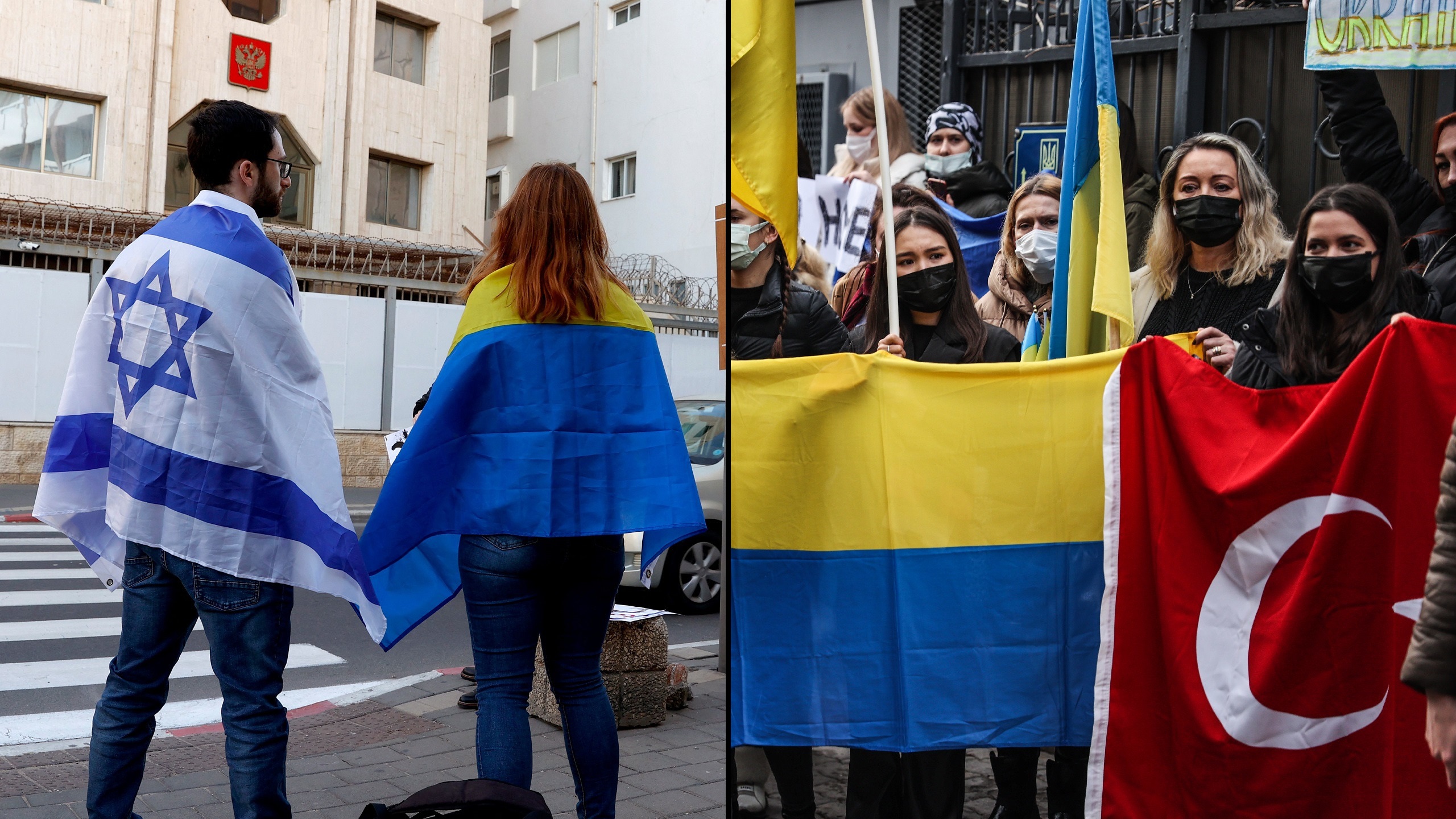Turkey, Israel Express Rare Criticism of Russia Over Ukraine Attack
Both countries have much to lose by angering Moscow
Turkey and Israel criticized Russia on Thursday for its invasion of Ukraine, marking their toughest condemnation of Moscow during the crisis.
Russia’s actions in Ukraine are “unacceptable” and a “heavy blow” to peace, Turkish President Recep Tayyip Erdoğan wrote on his Twitter account.
The Russian attack constitutes a “grave violation of the international order,” and Israel condemns it, Foreign Minister Yair Lapid said.
Nimrod Goren, the president and founder of Mitvim – The Israeli Institute for Regional Foreign Policies, said Lapid’s statement suggested there was a shift in policy toward directly blaming Russia.
Goren added that it would elicit positive reactions from Israel’s allies in the US and the European Union.
Israel’s reluctance to take a tougher approach on Russia was partly due to geopolitical considerations, he said, for example in Syria, where Jerusalem and Moscow have coordinated when the IDF planned strikes on Iran-backed groups.
However, since the US is Israel’s strongest ally, rebuking Moscow over the Ukraine invasion was expected, according to Goren.
“It consolidates Israel in that camp. It conveys a message that when Israel talks about democracy and liberal values, it is also willing to deliver on it, even if it is a bit concerned that other interests may be damaged,” he told The Media Line.
Lapid noted in his remarks that there are tens of thousands of Israelis and hundreds of thousands of Jews living in Russia and Ukraine.
Both Turkey and Israel have struggled to maintain a more neutral posture toward the crisis compared to the stronger rhetoric from their Western allies.
Both have strong military and strategic relations with the US that are highly significant in maintaining stability in their volatile region.
Over the weekend, Erdoğan’s spokesman told Germany’s Die Welt newspaper that sanctions would be useless.
Kristian Brakel, director of the Heinrich Böll Foundation’s office in Istanbul, said that while Turkey wants to improve relations with Washington it has failed to achieve any major breakthroughs, while Ankara needs to maintain good relations with Russia, including in the spheres of energy and security.
Erdoğan has indeed chosen to move closer to Moscow, for instance with the purchase of the S-400 Russian anti-missile defense system, angering the US.
Brakel said he doesn’t believe the Turkish president wants to give up on the attempt to balance the two powers.
“[This] puts it [Turkey] in a difficult position,” Brakel said. “Ankara doesn’t want to go too far with its Russian allies.”
Turkey faces a particular challenge, as it is closer to Russia and has a large coastline on the Black Sea across from Russia and Ukraine.
It also plays a special role in maritime access in the region due to the 1936 Montreux Convention Regarding the Regime of the Straits, which gives Ankara control over navigation between the Mediterranean and the Black Sea.
Vasyl Bodnar, Ukraine’s ambassador to Turkey, said on Thursday he has requested Ankara block Russian ships from using the Dardanelles and Bosporus straits to reach the Black Sea.
Kerim Has, a Moscow-based political analyst focusing on Russia and Turkey, said that while Ankara would get major support from the US if it closed the straits to the Russian military, he did not believe it would happen. “It would be like declaring war against Russia,” he said.
Ankara needs to take a cautious approach because of its wide-ranging interests in maintaining ties with Moscow, Has said.
“Turkey has many, very deep relations with both sides,” Has told The Media Line. “The causes of the war will directly affect Turkey in every sense … [its] position in this war is quite unique.”
Russia would have several options if it chose to punish Ankara, including in Syria where the two countries have forces and support opposing sides.
Moscow could also support an attack on the northwestern Syrian region of Idlib, near the border with Turkey. Ankara has long feared that an attack on the area would force residents to flee to Turkey where millions of Syrian refugees already live and where tensions with Turkish citizens have sometimes turned violent.
That would place strong domestic pressure on Erdoğan, whose popularity has slipped during an economic crisis.
Russia, which is a top source of tourists for Turkey, could also limit visits from its citizens.
Last year, Russia limited flights to Turkey, which badly hit the country’s important tourism sector. Moscow said this was due to the high number of COVID-19 cases in the Anatolian nation, but analysts suspected it was due to Turkey’s cooperation with Ukraine, including the sale of drones by Ankara.
Russia’s announcement that it would limit flights came two days after Ukrainian President Volodymyr Zelenskyy visited Erdoğan and the Turkish president said his country supported Ukraine’s territorial integrity.


